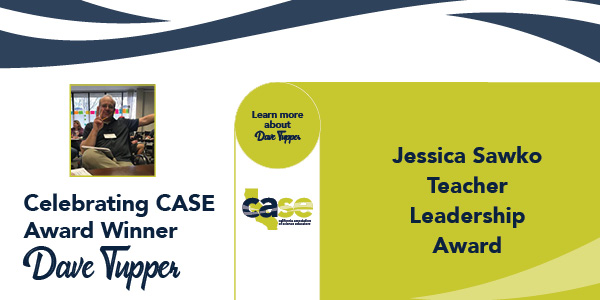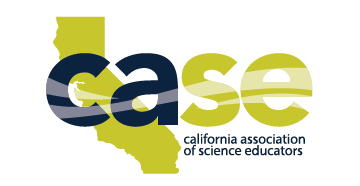
Dave Tupper
2020 Award Winner
Jessica Sawko Teacher Leadership Award: Dave Tupper

How has your experience with NGSS impacted your views of science education?
I would say my views have been validated and refined. Through my experiences in classrooms TK→ higher ed, I have observed firsthand the impact the NGSS shifts can have on student enthusiasm, conceptual understanding, facility with the 3-dimensions, and their attitudes toward science. NGSS helps students see themselves as learners while building learning communities that work together to figure things out.
In a broader sense, science educators continue to demonstrate the capacity, willingness, and foresight to identify and address the systemic needs for implementing high quality science for all kids in a way that I haven't observed in other content areas. So many organizations have come together to align efforts and clarify what NGSS teaching and learning can look like; it has been a sight to see. Science folks know how to get things done and I am super proud to be part of the community that works so hard to do good things for kids.
The more time I spend around the science community the more I learn.
How do you think science education will evolve as NGSS becomes more widespread?
Over the next few years, I believe that science education will experience a resurgence allowing for the effective scaling up of NGSS. I think this for a few reasons:
The collaborative work that has and continues to be done with so many science organizations in California has laid a foundation and built incredible leadership capacity up and down our state in ways that support all components of the system in scaling up high quality NGSS aligned science teaching and learning for all kids.
As instructional material becomes more available and science becomes a more visible component of the state assessment system, I would expect to see a marked increase in both the quality and amount of science instruction particularly at elementary school.
As we sit in the middle of a pandemic, the need for effective science instruction that leads to a scientifically literate citizenry has never been more obvious. Many stakeholders are already or will be expecting and pushing for student science experiences to become more robust.
What lessons have you learned while working as a TOSA and how has it impacted you personally and professionally?
Relationships matter and collaboration is key. Everything boils down to relationships as ultimately we are doing the work for kids and each other.
Improving the system means investing in people; they are the ones that carry the work forward through the noise of the various shiny objects or new initiatives that can often distract organizations. Put good people in place, support them, and they will always rise to the occasion. It is what teachers do.
Many of my personal and professional relationships are indiscernible from one another. It is inspiring, we all work incredibly hard, and the work sure goes easier when you are with friends.
Be in the right place at the right time, and have a plan.
I think being a TOSA forces you to really nail down your Core Values. Where are you willing to compromise and where is the line in the sand in terms of what is good for kids?
What motivated you to pursue your career in science education?
Not sure that I pursued the career rather than grew along with it as opportunities presented themselves. I have always been interested and involved in science and enjoy learning as much as I can about everything that I can.
I realize now that as a science community we work hard to develop leadership and opportunities as a way to pay it forward, build capacity, and scale the work. I am a lucky recipient of many opportunities provided by others...I seem to have an issue saying no, and couldn’t be happier about it.
How has COVID changed your outlook on science education?
I think my outlook is the same, in the sense that we continue to strive for equitable access for all students to a high quality NGSS aligned science experience from the beginning of their schooling through to college and career. We push for science as a core content area for all kids.
COVID has really laid bare all of the access and equity gaps that we knew were there already and were working toward addressing, now I am finding myself and my colleagues having to advocate even harder to keep science from being marginalized or in some cases eliminated.
This strengthens my resolve to keep fighting as it is a concern that much of the field's hard work may be set back...and old habits set in. We all need to do as much as we can to keep science on the front burner. Helping our fellow educators prioritize quality science as an opportunity for connecting students to school and linking content areas, rather than as a sort of bonus content area that can be discarded when time gets tight.
Quick Links
Exhibit Partner Package
Opening Soon
Join us at the 2025 California Science Education Conference, the premier event for science educators across California! This gathering is your chance to showcase your products, engage with educators, and maximize your impact through our exclusive Partner Program.

